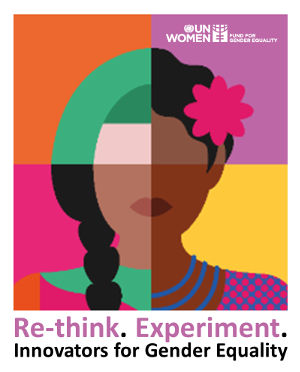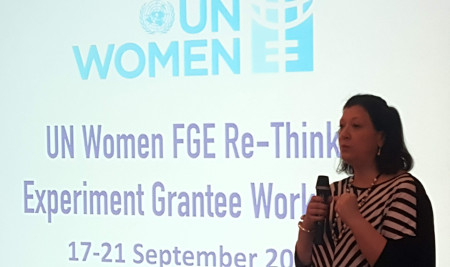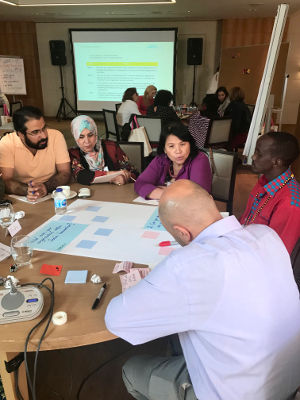Testing new approaches to leave no woman and girl behind
Women’s rights organizations from eight countries gather to identify and prototype new solutions to gender equality challengesDate:

Experienced civil society activists from Albania, Algeria, Lebanon, Nigeria, Palestine, Paraguay, Philippines and Tanzania are challenging their assumptions about gender equality programming. Gathered this week in Istanbul, they are exploring new ways to look at the problems faced by women and girls and identifying new solutions to test.
How can rural women from disadvantaged communities transition from small-scale producers to profitable entrepreneurs? How can we find creative solutions to keep women’s rights in the political agenda in a conflict setting? How can we address specific cultural barriers that hinder women’s political participation? How can we engage migrant workers in learning activities that will support their successful return? How can we motivate more domestic workers to join associations to claim their labor rights?
These were some of the initial challenges identified by UN Women’s Fund for Gender Equality (FGE) grantees as recurrent stumbling points that prevent them from achieving larger scale results. Being complex, “wicked” problems, they require engaging with unusual actors, exploring new points of view, trying innovative solutions. And this is what the Fund’s “Re-think. Experiment.” pilot is trying to enable.

Alia El Yassir, UN Women Regional Director for Europe and Central Asia and Representative to Turkey, welcomed the international innovators for gender equality by stressing the importance of changing the way we work and use new approaches such as social innovation to achieve the 2030 Development Agenda. “This is a moment to re-think what we are doing, to think outside the box and experiment,” she said.
The eight participating civil society organizations (CSOs), previous recipients of UN Women’s grants, spent the past two months interviewing project beneficiaries – the ‘end users’ of their projects – partners and their own colleagues and reflecting about key actors and their roles, in the hope of gaining a deeper understanding of the realities that the most disadvantaged women face – their real needs and motivations.
“The best aspect of this [research] exercise was to be able to have conversations [with beneficiaries] at such a personal and emotional level. It was a very special moment,” shared one of the grantee representatives from Paraguay. “We thought we knew everything about the issue, but the interviews showed there are things we had not understood,” said another civil society partner from Tanzania.
The targeted beneficiaries in this initiative are women from some of the most marginalized groups including indigenous women, domestic workers, conflict-affected women, migrant workers, rural women, widows and survivors of gender-based violence.

This highly experiential workshop that will conclude on 21 September is allowing the organizations to use social innovation tools to develop beneficiaries’ archetypes or “personas”, build empathy maps, ideate, and design prototypes for new beneficiary-centered solutions. Participants are also taking advantage of such a diverse array of expertise in the room to share experiences with and provide advice to fellow innovators from other countries, making it a rich South-South co-creation space. “The positive energy, the friendly environment and all the collaboration and joint brainstorming are helping me learn a lot and make linkages between ideas,” reflected one representative from an Albanian NGO.
An additional allocation by the Fund of $15,000 will enable each grantee to test their prototypes in the coming months.
First time for the Fund for Gender Equality, and a rare experience in the development community, this initiative is giving women’s organizations a safe space for experimentation and failure. The objective is to come up with tested models that solve challenges for women’s empowerment and with potential to catalyze change at scale.
“Some will succeed, and some will not. All – including us at UN Women – will learn from it, and hopefully improve our role as service providers for the women and girls furthest behind,” says Nancy Khweiss, Coordinator of the Fund for Gender Equality. “The world is changing fast and if we want to have an impact we need to explore new ways of working together. We want a strong women’s movement, we want efficient and effective solutions that respond to actual women’s needs, and that requires collaboration, creativity, flexible processes and an open mindset.”
“Re-Think. Experiment” is part of the Fund’s 4th grant-making cycle ‘Scale and Innovation Initiative 2017-2019’, funded by the Government of Germany. For live updates from the workshop follow us on Twitter through FGE’s hashtag #Fund4GE.
Click the link to read the factsheet on the social innovation initiative.